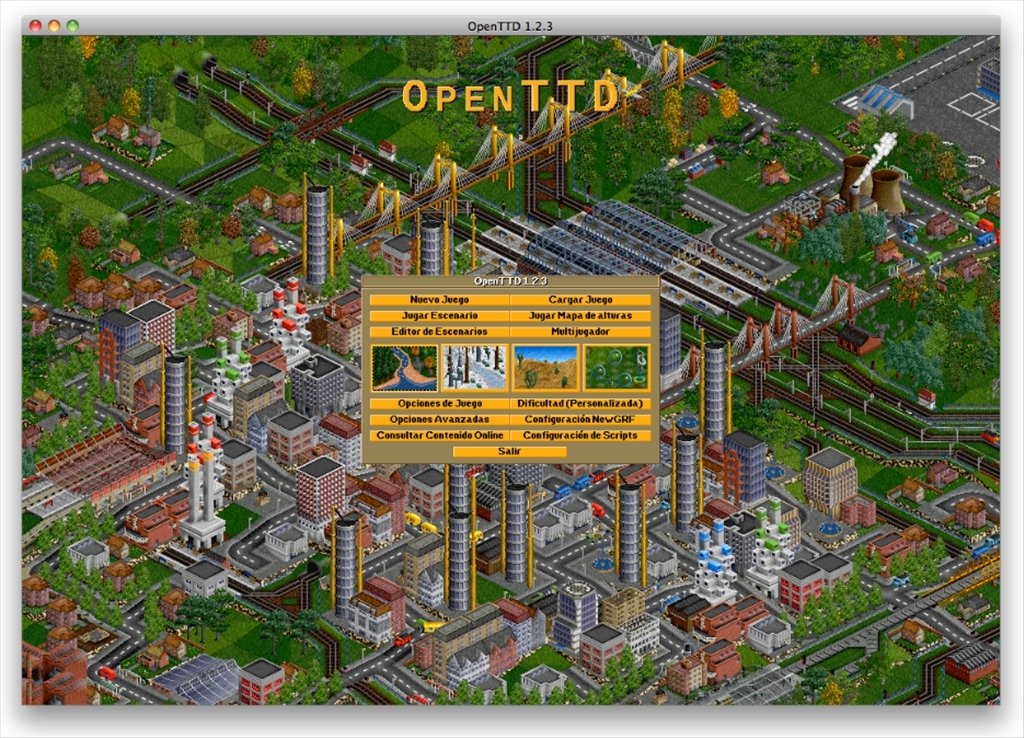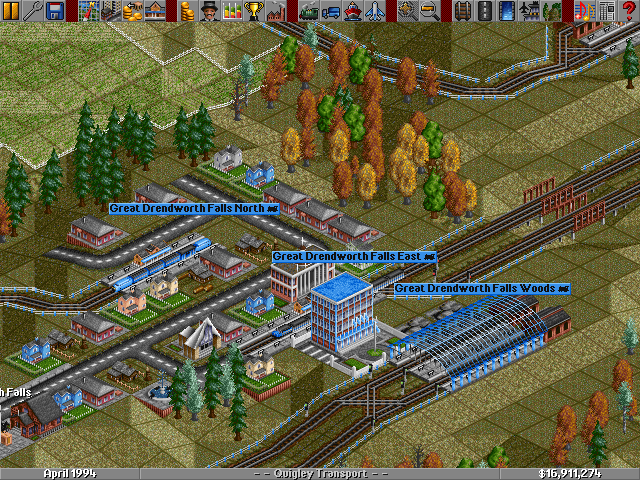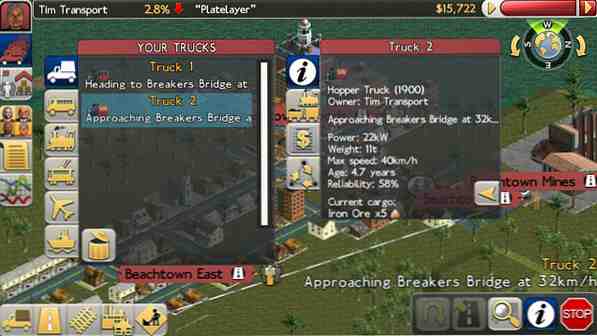All students (R2013, R2014, R2015 & R2019) are informed that the End Semester Regular Online Theory Examinations and Arrear Online Theory Examinations of the ODD semester 2020-21 for II,III & IV Year B.E.,B.Tech scheduled on are postponed to. The examinations scheduled from will be held as per schedule. Apr 16, 2021 A rags-to-riches millionaire, media tycoon Jimmy Lai is a self-styled “troublemaker” who has long been a thorn in Beijing’s side thanks to his caustic tabloids and unapologetic support for democracy. The 73-year-old was convicted over his activism for the first time on Friday, handed a 12.

Transport Tycoon Game
Business simulation games,[1][2] also known as economic simulation games[3][4] or tycoon games, are games that focus on the management of economic processes,[5] usually in the form of a business. Pure business simulations have been described as construction and management simulations without a construction element,[2] and can thus be called management simulations.[2] Indeed, micromanagement is often emphasized in these kinds of games. They are essentially numeric, but try to hold the player's attention by using creative graphics.[2] The interest in these games lies in accurate simulation of real-world events using algorithms,[6] as well as the close tying of players' actions to expected or plausible consequences and outcomes.[6][7] An important facet of economic simulations is the emergence of artificial systems, gameplay and structures.[8]
There are many games in this genre which have been designed around numerous different enterprises and different simulations. Theme Park can be called a business simulation because the goal of the game is to attract customers and make profits, but the game also involves a building aspect that makes it a construction and management simulation.[2] This genre also includes many of the 'tycoon' games such as Railroad Tycoon and Transport Tycoon. Another similar example of a business simulation (that models a startup business) is 'SimVenture Classic'.

Trevor Chan is a notable developer of business simulation games,[9] having developed the 1995 game Capitalism which has been described as the 'best business simulation game'.[1] A sequel was released entitled Capitalism II in 2001. An expanded version of Capitalism II, called Capitalism Lab,[10] was released in 2012 and continues to be updated regularly with new features and improvements.
- This is a recreation of the Transport Tycoon. Game is HTML5 compliant and can be played in every major browser like chrome or firefox. In single-player mode you can play in Transport Tycoon against computer (AI: AdmiralAI, AIAI, NoCAB, SimpleAI, Trans AI). Multiplayer mode is highly experimental, server can take up to 255 players in 15 companies.
- Transport Tycoon is a video game designed and programmed by Chris Sawyer, and published by MicroProse in 1994. It is a business simulation game, presented in an isometric view in 2D with graphics by Simon Foster, in which the player acts as an entrepreneur in control of a transport company, and can compete against rival companies to make as much profit as possible by transporting passengers.
- Transport Tycoon svscripthookallowed false tags tycoon,trucking,piloting,simulator uptime 03h 26m minutely. Online players by time. Rating and points. Players statistics for 24 hours This function is available only to.

Active development of Internet technologies and the growth of the Internet audience in recent years gave a powerful impetus to the development of the industry of online games, and in particular, online business simulations.[11] There are many varieties of online business simulations - browser-based and downloadable, single-player and multiplayer, real-time and turn-based. Some online simulations are aimed primarily at the leisure market while others have real world applications in training, education and modelling.
Real-world applications[edit]
Because business simulations simulate real-world systems, they are often used in management, marketing, economics and hospitality education.[11][12] Some benefits of business simulations are that they permit students to experience and test themselves in situations before encountering them in real life,[13] they permit students to experiment and test hypotheses,[13][14] and that subjects seem more real to them than when taught passively from the blackboard.[13] They are also used extensively in the professional world to train workers in the financial industries,[15][16] hospitality and management,[16] and to study economic models[17] (an association of professionals, ABSEL, exists for the sole purpose of promoting their use[15]), with some simulations having in excess of 10,000 variables.[17] Economic simulations have even been used in experiments, such as those done by Donald Broadbent on learning and cognition that revealed how people often have an aptitude for mastering systems without necessarily comprehending the underlying principles.[18] Other games are used to study the behavior of consumers.[19]
History[edit]
An early economic sim by Danielle Bunten Berry, M.U.L.E., released in 1983, foreshadowed events that would transpire later in video gaming history, especially in the massively multiplayer online game market, with regard to player cooperation and simulated economies.[20] The game was Electronic Arts' most highly awarded game, despite selling only 30,000 copies.[21] That same year, Epyx released the business sim Oil Barons.[22]
See also[edit]
Transportation Tycoon 2

References[edit]
Transport Tycoon Online
- ^ abReview - IGN: Trevor Chan's Capitalism II
- ^ abcdeRollings, Andrew; Ernest Adams (2003). Andrew Rollings and Ernest Adams on Game Design. New Riders Publishing. pp. 417–441. ISBN1-59273-001-9.
- ^IGN: Air Bucks,
- ^News - IGN: Big Biz Tycoon Ships
- ^Rollings, Andrew; Ernest Adams (2006). Fundamentals of Game Design. Prentice Hall.
- ^ abLaramee, Francois Dominic (2002). Game Design Perspectives: Advances in Computer Graphics and Game Development. Charles River Media. p. 117. ISBN1-58450-090-5.
- ^Slator, Brian M.; Richard T. Beckwith; Harold Chaput (2006). Electric Worlds in the Classroom: Teaching and Learning with Role-Based Computer Classes. Teachers College Press. p. 61. ISBN0-8077-4675-4.
- ^Natkin, Stéphane (2006). Video Games and Interactive Media: A Glimpse at New Digital Entertainment. A K Peters, Ltd. p. 97. ISBN1-56881-297-3.
- ^IGN: Joan of Arc Interview
- ^https://www.capitalismlab.com
- ^ abOnline Business Simulations
- ^Farkas, Meredith (2007). Social Software in Libraries: Building Collaboration, Communication, and Community Online. Information Today, Inc. p. 216. ISBN978-1-57387-275-1. Retrieved 2008-06-18.
- ^ abcSchurr, Sandra (1994). Dynamite in the Classroom: A How-to Handbook for Teachers. National Middle School Association. p. 73. ISBN1-56090-041-5.
- ^Thole, Heinz-Jürgen; Claus Möbus; Olaf Schröder (1997). 'Domain Knowledge Structure, Knowledge Representation and Hypotheses Testing'. Artificial Intelligence in Education: Knowledge and Media in Learning. IOS Press: 410. ISBN978-90-5199-353-0.
- ^ abRutter, Jason; Jo Bryce (2006). Understanding Digital Games. Sage Publications, Inc. p. 227. ISBN1-4129-0033-6.
- ^ abFallows, Stephen J.; Kemal Ahmet (1999). Inspiring Students: Case Studies in Motivating the Learner. Routledge. p. 63. ISBN0-7494-2872-4.
- ^ abGatti, Domenico Delli (2000). Interaction and Market Structure: Essays on Heterogeneity in Economics. Springer. p. 37. ISBN3-540-66979-5.
- ^Hogarth, Robin M. (2001). Educating Intuition. University of Chicago Press. p. 184. ISBN0-226-34860-1.
- ^Jain, L. C.; R. J. Howlett; N. S. Ichalkaranje; G. Tonfoni (2002). virtual environments for teaching & learning. World Scientific. p. 20. ISBN981-238-167-8.
- ^Sharkey, Scott (January 22, 2004 – January 12, 2005). 'The Essential 50 Archives'. 1UP.com. Archived from the original on 2009-03-06. Retrieved 2008-06-18.
- ^DeMaria, Rusel; Johnny L. Wilson (2004). High Score!: The Illustrated History of Electronic Games. McGraw-Hill Professional. pp. 174–175. ISBN0-07-223172-6.
- ^http://www.mobygames.com/game/oil-barons MobyGames. 'Oil Barons,' (retrieved on January 25th, 2009).
Transport Tycoon Deluxe Windows 10
